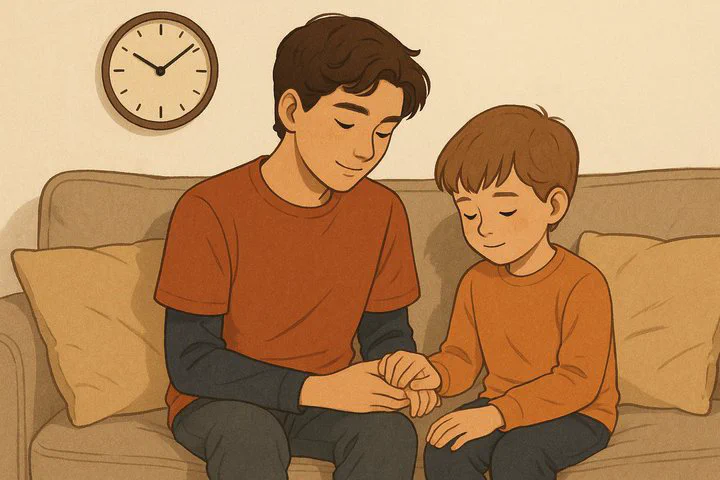Is Having a Teen Care for Siblings Considered Abuse

Is Having a Teen Care for Siblings Considered Abuse?
Imagine you have to work a double shift, and your 15-year-old offers to watch their younger brothers and sisters. You might wonder, is having a teen care for siblings considered abuse? The answer depends on the laws where you live and how much weight you put on your teen’s shoulders. Let’s look at the legal rules, the emotional impact, and how to plan so everyone stays safe and happy.
Understanding the Legal Rules
First, every state has its own guidelines about kids staying home alone. Some are clear. You may have heard, “It’s illegal to leave children home alone when they’re under the age of 14.” That is true in states like Illinois. Other states, like Texas, give no exact age but still expect parents to choose wisely.
A quick look at two examples helps:
• Illinois: The law says children under 14 should not be left home alone. If a 13-year-old is babysitting, Child Protective Services (CPS) could call it neglect.
• California: No set age, but CPS will ask about the teen’s maturity, how long they watched younger kids, and if food and safety plans were in place.
School rules matter too. Is having a teen stay home from school to care for their siblings considered abuse? If your teen misses many days, the school can mark them truant and report you to CPS. Having a child stay home from school to watch younger siblings often raises red flags, especially if grades fall.
To stay on the safe side:
- Check your state’s “home-alone” age on the government website.
- Leave an easy-to-read list of emergency numbers.
- Set clear times when you will call or come home.
When you follow local rules and make sure your teen feels ready, most experts would say no—is having a teen care for siblings considered abuse in that moment? Probably not. But if the teen is overwhelmed or the younger kids are unsafe, CPS may see it as neglect.
Emotional and Psychological Impact
Laws are only part of the picture. Teens are still growing. If they cook dinner, help with homework, and change diapers every day, the load can get heavy fast. They may feel they are losing their own childhood. A bad day can feel even worse when there is a family emergency where one of the children ended up in the hospital and they think it is their fault.
Watch for these warning signs:
• Falling grades or skipped homework
• Headaches, stomachaches, or trouble sleeping
• Anger toward parents or younger kids
• Pulling away from friends and fun activities
Here are simple ways to help:
• Do a weekly “feelings check.” Ask, “How did babysitting go? What was hard? What was easy?”
• Praise your teen for every win, even small ones like getting the toddler to bed on time.
• Offer breaks—let them hang out with friends, play sports, or just relax.
• If stress builds, talk with a school counselor or a family therapist.
By checking in and sharing the load, you lower the chance your teen will ask themselves, is having a teen care for siblings considered abuse? They will see it as teamwork instead.
Balancing Family Needs and Responsibilities
Life can be unpredictable. A flat tire, a late work shift, or another family emergency where one of the children ended up in the hospital can happen any day. A plan made ahead of time keeps panic away.
Use this Quick-Plan Checklist
- Trusted Helpers
• List three adults or older teens nearby who can step in. - House Rules
• How many hours can the teen babysit?
• What foods can they cook or order?
• Screen time limits for younger kids. - Safety Steps
• Post 911, your work number, and poison control on the fridge.
• Show where first-aid supplies are kept. - School First
• Homework comes before chores.
• No babysitting during school hours without a true emergency.
Print this list and stick it on the fridge. You can also download a free template on FamilyGuideCompass.com.
After any babysitting stretch, hold a quick family meeting:
• What went well?
• What was tricky?
• What can we change next time?
Praise your teen and give them time off for fun. Clear limits, good planning, and open talks keep everyone safe and prevent neglect.
Conclusion and Next Steps
So, is having a teen care for siblings considered abuse? Most of the time, no—when you follow the law, watch your teen’s stress level, and keep school a top priority. Abuse or neglect may come into play if the teen’s safety, schooling, or mental health suffers.
If you still have questions:
• Call your state’s CPS hotline for clear rules.
• Talk with a family law attorney for legal advice.
• Join our online forum to share your own tips and stories with parents just like you.
Your family is unique, and support is out there. With good planning and open hearts, your teen can help at home without sacrificing their own well-being.